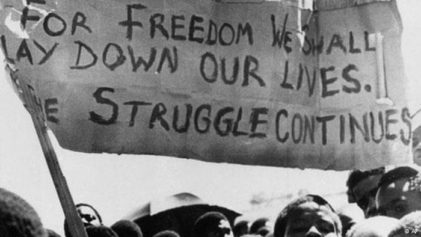The celebration and mourning of Nelson Mandela neared its end today when his body was flown from Pretoria, where it had lain in state for three days, to his home province of Mthatha in preparation for the funeral and burial tomorrow in Qunu, the village where he grew up.
Draped in the black, gold and green flag of the African National Congress, Mandela’s casket was handed from the military to the ANC as mourners stopped by to pay last respects.
“We are sending you back to Qunu,” President Jacob G. Zuma said in his eulogy. “We hope you rest in peace.”
This time Zuma wasn’t booed, as he was at the large stadium memorial on Tuesday that was attended by more than 90 world leaders. Zuma sat between Mandela’s widow, Graça Machel, and his former wife, Winnie Madikizela-Mandela.
Zuma then led the crowd in singing “Senzeni Na,” a mournful song that was sung frequently during the ANC’s fight against apartheid.
“What have we done,” he sang. “Our sin is blackness. Our sin is the truth. They are killing us. Let Africa return.”
Along the road from Mthatha to Qunu, hundreds of residents stood singing, clapping and waving South African flags, desperate for a glimpse of Mandela’s procession.
“He is our father; we must welcome him home,” Boneka Mpopoma, 48, a schoolteacher who walked several miles from her village to join the throng, told the New York Times. Mpopoma said that Mandela’s burial in his homeland was an essential part of Xhosa culture.
“You must bury him where he was born,” she said. “He must rest with his father’s fathers.”
Felicity Mgoqi, 58, who returned to her hometown of Qunu to bury her mother on Saturday, was upset that community members could not freely attend Mandela’s funeral.
In Xhosa tradition, invitations aren’t customarily issued for funerals.
“We are very disappointed that they didn’t let us see him,” said Sibongiseni Hloma, a clerk in the local courts. “In our culture, funerals are for the whole community. Nobody is invited because everyone is invited.”
“Now we are so very sad because we didn’t see him when he’s buried,” she said on Saturday.
“Madiba always treated everybody the same,” Nomanono Molletye, a 61-year-old grandmother, told the Times. “There were no VIPs to him.”



